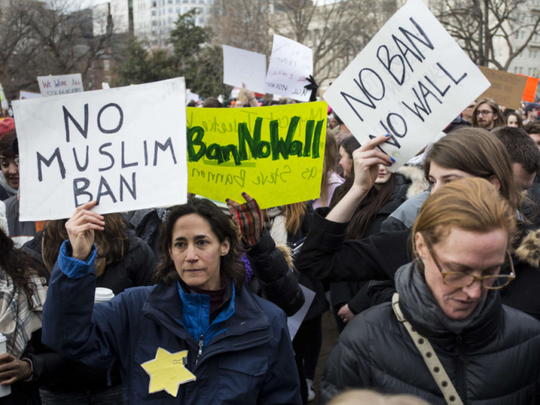
Calling the move cowardly and dangerous, the New York Times said in an editorial: “The unrighteousness of this new policy should be enough to prompt the courts, Congress and responsible members of Trump’s cabinet to reverse it immediately. But there is an even more compelling reason: It is extremely dangerous. Extremist groups will trumpet this order to spread the notion, today more credible than ever, that the United States is at war with Islam rather than targeting terrorists. They want nothing more than a fearful, recklessly belligerent America; so, if anything, this ban will heighten their efforts to strike at Americans, to provoke yet further overreaction from a volatile and inexperienced president. Republicans in Congress who remain quiet or tacitly supportive of the ban should recognise that history will remember them as cowards,” the paper said.
The Washington Post called Trump’s decision “an affront to values upon which the nation was founded and that have made it a beacon of hope around the world. “George Washington declared in 1783 that the ‘bosom of America is open’ not only to the ‘opulent and respectable stranger’ but also ‘the oppressed and persecuted’. Now Trump has slammed the door on the oppressed and persecuted in a fit of irrational xenophobia,” the paper said in an editorial. “Trump’s actions pander to rage and fear of outsiders. Yet our long history shows these fears are unfounded.” The diversity, experience and striving of immigrants and refugees have immeasurably strengthened the United States; outbursts of anti-alien sentiment have only weakened it,” the paper said.
The USA Today said Trump’s refugee ban is frightfully arbitrary and indiscriminate fear-mongering should not be allowed to undermine American values. “The president has enormous discretion under the immigration laws. But he doesn’t have a blank cheque. His decision to give priority to religious minorities could violate First Amendment safeguards against discrimination based on religious beliefs. And by selectively banning all people from certain countries, Trump could run afoul of 50-year-old revisions in the immigration law preventing discrimination based on country of origin,” the paper said in an editorial.
The Sunday Times in London praised British Prime Minister Theresa May’s visits to the US and Turkey. “Theresa May has every reason to feel satisfied with her foreign travels of recent days and, in particular, her meeting with Donald Trump. The prime minister extracted from the president that he is committed to Nato, although in her words not his, and set the ball rolling for a future trade deal between Britain and America. Her visit to Turkey established new ground on what may also be an important future relationship,” the paper said in an editorial.
“Although May has little foreign policy experience, she set out in her speech to the Republican retreat in Philadelphia a clear foreign policy agenda, questioning interventionism while maintaining a strong guard against the threats to our security, including from Russia. It was an assured debut,” the paper said.
The Guardian said the British prime minister survived her first ordeal by Trump, particularly the press conference which it characterised as an off-scale risk. “Politically, it was a dash across sniper’s alley. Trump might again say something new and shocking. May would have to respond. Not surprisingly, there was doubt about whether there would even be a press conference Rightly, it went ahead. The stakes for both leaders were very high and different. But they got safely to the other side,” the paper said in an editorial. “The main danger facing any British prime minister in the relationship with America is hubris. Pushed by the press and fired by Britain’s seemingly indestructible institutional desire to be loved by America, prime ministers feel the need to seize first friend status and hug it close. Sometimes, however, this can become a destructive desire, as Tony Blair found in his relationship with George W. Bush.” These visits ought not to matter too much. But they do. May will feel that she did well. All of us are glad it is now over. In the end, though, Trump is the master of his own fate and, if May is not careful, he will be master of hers as well,” the paper said.




_resources1_16a31069e4e_small.jpg)





